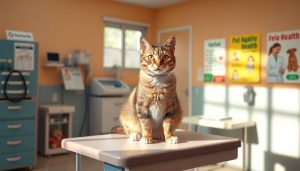Introduction: The Role that Accurate Cat Health Information Plays
Pet owners often consult the internet when they observe symptoms in their pets. It’s fast and full of information, but not all of it is reliable. Misinformation can cause delays in treatment or unnecessary worry. Knowing where to find trustworthy information helps you catch health problems early and get proper care. The right knowledge makes you confident in making good health decisions for your cat.
The Basics of Online Cat Health Research
Advantages of Online Research for Cat Owners
When your cat shows signs of illness, researching symptoms and treatments online can help you prepare. It’s cost-effective, fast, and provides comfort from reading others’ experiences. While it’s not a replacement for vet care, it’s a strong first step in judging the severity of an issue.
The Danger of Misinformation
Untrustworthy websites can spread confusion or even dangerous advice. Myths, miracle cures, or exaggerated claims should be treated with caution. Always cross-check any advice with reliable sources before taking action.
Three Key Criteria for Reliable Online Resources
- Look for veterinary logos or affiliations with recognized organizations.
- Check that content is updated and backed by science.
- Avoid sites overloaded with ads or exaggerated headlines.
Identifying Common Cat Health Issues & How to Research Them Effectively
Recognizing Symptoms of Common Cat Illnesses
Some symptoms, such as itching or hair loss, may signal allergies or infection. Noticing patterns early helps narrow down causes and prompt action.
How to Utilize Search Engines for Accurate Information
Use specific search phrases like “cat sneezing with watery eyes” and limit your reading to vet-affiliated websites. Avoid sensationalized or vague headlines, and review results with a calm, logical mindset.
Evaluating the Credibility of Sources
- Look for authors with veterinary credentials.
- Check website reviews and recommendations.
- Note when content was last updated — avoid outdated advice.
Internet Sources for Cat Health Knowledge
Trusted Certification Websites and Databases
- AAFP (American Association of Feline Practitioners) – Resources on feline-specific conditions.
- PetMD – Articles written by veterinarians on a wide range of cat health topics.
- VCA Hospitals – Includes symptom checkers and treatment guidance.
- University Vet College Sites – Provide research-backed and detailed information.
Online Forums and Community Support Groups
Forums like Reddit’s r/CatHealth and cat owner groups offer support, but advice should always be confirmed with licensed veterinary sources. Community stories help emotionally, but they don’t replace professional help.
Teleconsult and Virtual Consultations
Online consultations with vets are growing. Keep records of symptoms, changes, and behaviors to share. Virtual consults can save time and help with basic concerns, but serious conditions still require physical exams.
How to Conduct Effective Online Research
- Observe and record your cat’s symptoms in detail.
- Cross-check information across multiple trusted websites.
- In emergencies, always go to a vet — don’t rely on online advice alone.
- Save useful links and guides in a dedicated folder for future use.
Veterinary Professionals in Online Health Care
Online research helps educate you but should never replace actual vet advice. Vets guide you in identifying trustworthy information and determining when immediate care is needed. Seek help quickly if your cat is bleeding, struggling to breathe, or displaying serious symptoms.
Conclusion: Helping Cat Owners be Wise Online Researchers
Smart, well-informed research can improve your cat’s health and well-being. Use only science-based sources and verify facts before applying them. The internet is a helpful tool — but professional veterinary advice remains essential. Learn, double-check, and act responsibly for your cat’s best care.









